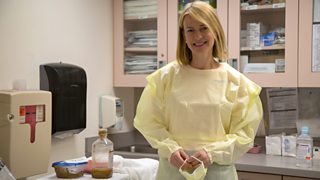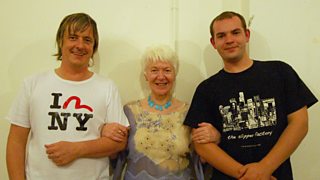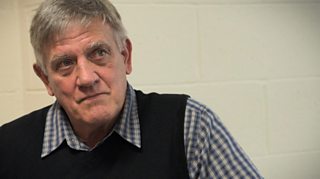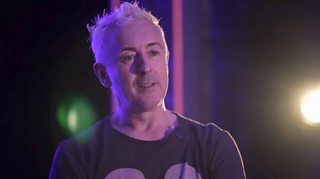How poo is being used to treat a life-threatening illness
An unusual treatment can transform the lives of people suffering from a potentially fatal infection.
The deliveries to one Aberdeen business are rather different to those most workplaces would readily accept.
As Brainwaves reveals, the staff at one enterprising company receive regular donations of human faeces but, rather than being an act of protest, it's all in the name of medical science.
Following treatment, the stools can be used in a treatment for Clostridium difficile (C. difficile), a bacterium found in the bowel that can cause severe and potentially fatal diarrhoea.
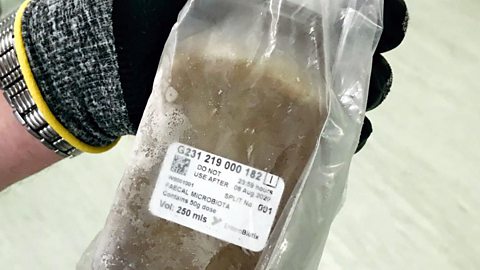
Faecal transplants
Dr James McIlroy on the potential benefits of treating patients with stool.
Dr James McIlroy founded EnteroBiotix after learning of the success medical researchers had in treating C. difficile by transferring stool from a healthy donor into the intestinal tracts of people with the infection.
The aim of the procedure is that bacterium in the donor stool will overpower the C.difficle and create an improved, healthier gut.
"Over 90% of these patients who were extremely sick were cured of their infection through the faecal transplant," explains Dr McIlroy.
"I realised that the procedure was performed relatively crudely, and some patients were doing this themselves at home. And I thought, 'There has to be a better way of doing this'."
'We take out the sweetcorn'
When the deliveries arrive production manager Nic Robinson and his team get straight to work.
He explained the need for a quick turnaround: “It’s all processed within six hours, to keep the bacterium [present in the stools] in pristine condition."
The stool is blended into a smooth suspension and pushed through a filter.
“You don’t want the big bits," says Nic. “We’re going to take out the sweetcorn!”
The processed stool is frozen and ready to be sent to medics who will administer it via one of a variety of procedures such as a colonoscopy or rectal enema.
'Education is needed'
Some in the medical world are still to be convinced of this treatment.
“This is vastly different from the majority of medicines that [the clinical community] provide on a day to day basis," says Dr McIlroy.
"There is an education piece that has to happen across the clinical community, the scientific community and probably the patient and lay population as well."
While many of us might feel queasy at the very thought of a faecal transplant, Dr McIlroy notes that those in need have no such qualms.
"The patients who have got these diseases are very open to novel treatments because at the end of the day what they’re most interested in is feeling better," he says.
More on faecal transplants
On ����ý Sounds
-
![]()
Brainwaves: Poo, jobbies, stinks and why they matter!
Pennie Latin makes a frank and fearless journey into the workings of the human gut asking 'what's normal' when it comes to the quantity, quality and regularity of our poo.
Latest features from ����ý Scotland
-
![]()
'Wild swimming helps me process the grief of losing my son'
The benefits of cold water therapy.
-
![]()
Winter adventures are appealing, but an expert advises caution
Trips in winter require particular knowledge and skills.
-
![]()
The rescuers: Why volunteers risk their lives in mountain emergencies
Landward meets members of the Cairngorm Mountain Rescue Team.
-
![]()
‘Look for the light’ – practical tips to help you through another winter with SAD
Useful advice and tips to combat low moods at this time of year.
-
![]()
How you could be a binge drinker without even knowing
Binge drinking is classed as fewer units than many people may realise.
-
![]()
How chocolate biscuits and drama classes helped one man leave prison behind
The healing power of creativity.
-
![]()
'When people believe in you, it’s life-changing'
Author Graeme Armstrong revisits the man who helped turn his life around.
-
![]()
The 'breath-taking' display of US birds swept on to British soil
Recent storms have brought rare birds to our shores.
-
![]()
Six things we learned about Alan Cumming on Take the Floor (Spoiler: includes accordions)
The actor spoke to Take the Floor's Gary Innes.
-
![]()
How street gangs trap young men in a dangerous cycle of violence
The almost inescapable pull of life in a gang.
-
![]()
Why stylist Gok Wan believes there's no such thing as bad fashion
The fashion expert says we should stop following rules and do what feels right.
-
![]()
Is sending a CV still the right way to apply for a job?
They've been central to job applications for years, but are they worth it?
